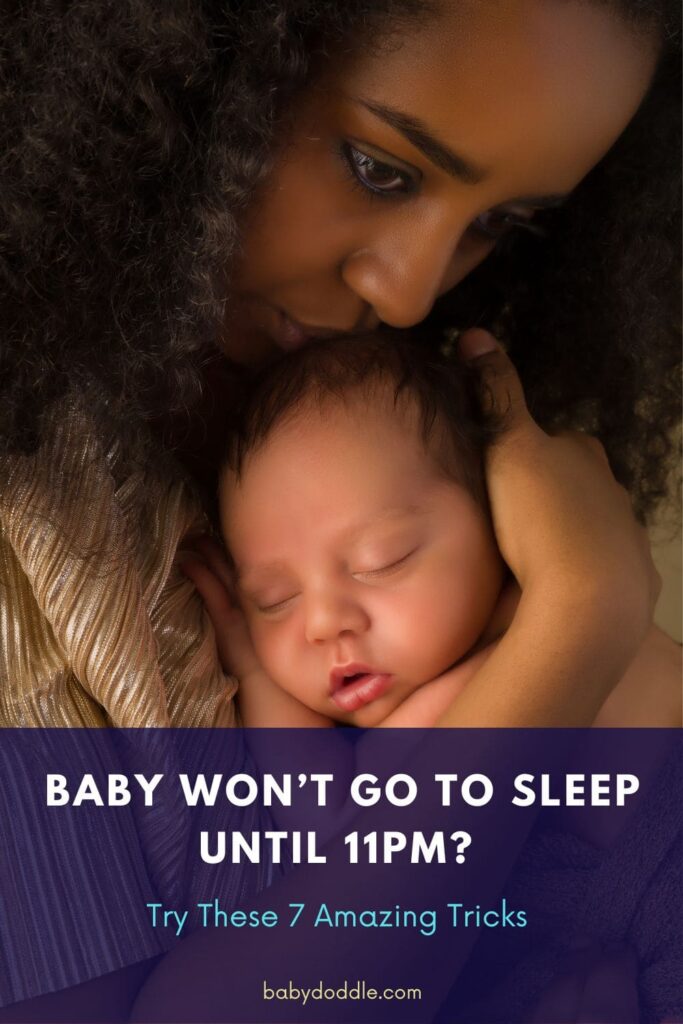Is your sweet babe fighting off sleep until all hours of the night? As an exhausted parent with a baby won’t go to sleep until 11pm or later, a child who refuses bedtime can be beyond frustrating. But have hope – with some effort and consistency using the tips below, you can shift your late-night owl’s schedule to an earlier, more reasonable bedtime.
I’ve been there myself. After my daughter Lucy was born, I couldn’t understand why she fought to sleep so intensely each night, refusing to go to sleep until 11pm no matter what I tried. And once she finally slept, she’d still wake frequently through the night! I felt like a zombie dragging myself through each day.
The crazy late bedtime also meant she slept half the day away. It became a vicious cycle where Lucy just wasn’t tired. I was lost on how to get my bright-eyed girl snoozing earlier with this 11pm sleep struggle. Exhausted, I frantically researched solutions for a baby that fights sleep and won’t go to bed.
When I discovered techniques that worked, I was shocked by how quickly Lucy’s bedtime shifted earlier from 11pm. She now snoozes soundly by 8pm most nights. I want to share what finally helped us in hopes it will bring you and your 11pm night owl some peace!
In this post, we’ll cover:
- Why does your baby fight sleep so hard
- Impacts of late, short sleep on babies
- Finding an appropriate bedtime
- Daytime solutions for earlier sleep
- Soothing pre-bed routines
- Managing stimulation before bed
- Persisting through sleep training
Read on for 7 tips that helped my strong-willed kiddo go from 11 pm bedtimes to dreamland by 8pm.

Why Won’t My Baby Go to Sleep Before 11pm?
Babies have a natural biological clock that signals when they should sleep. But it can take up to 6 months for an infant’s circadian rhythm to develop. Until then, babies struggle with day vs night cycles. Their sly grins and bright eyes when you’re trying to snooze them to sleep before 11pm are infuriating! Why do babies fight sleep when they so clearly need it?
Overtiredness – Ironically, a baby that fights sleep often does so because they are overtired. The more exhausted they get, the harder it is for them to wind down. This turned into a nightmare cycle for us where the later Lucy stayed up, the more wound up she became. She just wasn’t tired enough earlier to go down easy.
Sleep Associations – Rocking, nursing, swaying – these sleep associations become sleep crutches. Babies refuse to snooze without them, causing major bedtime battles. Does your little one only fall asleep if walked in the stroller? Then 11pm rolls around before you realize it.
Daytime Sleep – Long morning naps can mean the baby isn’t tired enough in the evenings. Limiting day sleep encourages sleep pressure build-up for earlier nights.
Natural Rhythm – Some babies are simply wired to be night owls, at least temporarily. Their circadian rhythms make them not tired enough for sleep until later. While frustrating, it’s normal and they will eventually shift schedules.
Take comfort in knowing there are clear reasons your bright-eyed baby fights sleep! The tips below helped rework Lucy’s rhythm towards earlier nights. Stay hopeful and know you will get there.

How Sleep Deprivation Impacts Babies
If your baby is sleeping only a few short stretches in 24 hours but fighting daytime naps, they are likely sleep-deprived. The impacts of sleep deprivation on still-developing babies can be worrying. Be sure your baby gets enough sleep each day.
Growth delays – Deep sleep releases human growth hormone, key for healthy development in infants. Without sufficient sleep, growth can lag.
Cranky mood – Overtired babies tend to be more irritable, crying more often. Sleep begets sleep, so the less they sleep, the harder sleep becomes.
Appetite changes – Too little sleep impacts appetite hormones like leptin and ghrelin. Ever notice your tot barely eating after a bad night? Lack of sleep suppresses appetite.
Development lags – Cognitive, social, and motor development rely on sleep. Deprived babies often experience delays in hitting milestones.
Weak immunity – Sleep facilitates disease-fighting antibodies and cells. Overtired babies get sick more often with low immunity. Prioritize their sleep!
While every babe is different, most experts recommend 14-17 hours of total sleep for newborns daily and 12-15 hours for babies up to 12 months old.
If your baby fights sleep and you are chronically short of these totals, take comfort that solutions exist to encourage earlier, sounder sleep.
Start by Finding an Age-Appropriate Bedtime
While 11 pm seems crazy late for bedtime by most parental standards, it may be entirely appropriate for your baby’s age, sleep needs, and natural rhythm. Finding the “right” bedtime is key for a fighting sleeper.
Check out average bedtime recommendations by age:
| Age | Ideal Bedtime Range |
|---|---|
| Newborns | between 9-10pm |
| 3 months | between 8-10pm |
| 6 months | between 7:30-9pm |
| 9 months | between 7-8pm |
| 1 year | between 6:30-8pm |
But averages are just guidelines. Pay attention to your baby’s tired cues. Note what times they get sleepy. An appropriate bedtime lands when baby is drowsy but still awake.
If your baby fights sleep until 11pm, it may just be their natural rhythm for now. As their circadian rhythm matures, their schedule will gradually shift earlier. Support them through the transition.

Adjust Day Sleep to Encourage Earlier Nights
Once you have an appropriate bedtime baseline, limiting day sleep can encourage earlier drowsiness. Here’s how to tweak day sleep:
Limit morning naps to 1 hour max. Long morning naps lead to overtired nights. Cap naps early.
Shift naps earlier – Try ending naps at least 5 hours before bedtime.
Wake your baby earlier from naps after 6 months old. Allowing tiredness to build up promotes earlier nights.
Cap total day sleep to 3 hours max for a great night.
Adjusting day sleep takes some effort but causes a helpful sleep deficit for nights. Baby wakes up tired for success falling asleep earlier.
Understanding Baby Sleep Cycles
As your baby grows, their sleep transforms dramatically in both cycle structure and duration. Knowing what’s happening can better equip you to encourage healthy sleep stage development.
There are two main types of sleep: active (REM) and quiet (non-REM). Active sleep features darting eyes with dreaming, increased breathing, and movement. Quiet sleep is restorative deep sleep characterized by stillness.
In the early months, your newborn cycles quickly between active and quiet sleep all day and night in roughly 50-minute intervals. Their initial long stretch of deep sleep right after falling asleep explains why you can’t keep a sleeping baby awake at this age!
As babies reach 6 months old, these sleep cycles extend with the percentage of time in active sleep decreasing and quiet sleep increasing. Around 9 months old, sleep begins consolidating at night with a more consistent cycle structure.
Daytime napping features shorter cycles with primarily active sleep. Nighttime sleep lengthens cycles, containing longer quiet sleep around when growth and repair hormones activate later in the night. Mature adult-like sleep architecture forms around age 2.
You can support healthy sleep cycle development by responding to signals:
- Allow day feeding upon wakings to cycle back into naps
- At night, wait for self-resettling instead of rushing to intervene
- Keep sleep conditions ideal for uninterrupted cycling
Trust your baby’s sleep stage progression. Stay tuned into their signals and patterns over time. Consistency, patience and biological readiness will shift those delightful developmental cycles – and your late-night baby – to earlier bedtimes.
Creating Consistent Wind-Down Routines
Just as adults associate certain nightly rituals with sleep, infants relish and respond to consistent pre-bed routines. Structure signals sleepy time is coming. Pamper your baby with soothing activities leading up to bedtime at the same time nightly.
If you have a little fighter, start routines 30-60 minutes before the age-appropriate bedtimes above. Over time, you can gradually shift earlier as the baby adjusts.
Calm play – Gentle play removes stimulation but gives personalized connection before bed. Hold baby close, and read stories in a hushed tone.
Baths – Warm (not hot!) bath water naturally induces sleep hormones because it mimics womb warmth.
Massages – Lightly massaging with lotion, even just baby’s hands or feet, is deeply relaxing.
Rocking chairs – Use an automatic rocker or glider for sleepy vibration cuddles. You should avoid feeding to sleep at this point – you’re just relaxing.
White noise – Pick a calming white noise like rain or wave sounds and play nightly. The familiarity signals sleep.
Gro-bag sleep sacks – Instead of loose blankets (suffocation risk!), use wearable sleep sacks to keep the baby cozy. The compression comforts infants.
Paci popping – Rub some breastmilk or formula on a pacifier and give it for soothing sucking at bedtime only. Pop it out once the baby is drowsy to avoid sleep associations.
Taking time for consistent, nurturing routines taps into the baby’s subconscious that bedtime is coming. Follow every step in the same order nightly. Routines build healthy sleep cues to replace negative associations so the baby settles more easily.
When first implementing structured bedtime routines for a resistant sleeper, know it may take 2 weeks to kick in. But stick with it – the payoff will be beyond worth it when your sweet babe starts passing out at appropriate, early times.
On rough nights, remind yourself how quickly children grow. The long nights don’t last forever.
Further Signal Sleep by Minimizing Stimulation
To set the stage for successful calming routines, minimize stimulating activities in the 2-3 hours preceding bedtime. While an obvious suggestion, it’s easy to lose track of time and overstimulate your baby.
Shift gears early – After dinner time, transition to quieter play. Start reading books versus intense games of peekaboo. Speak in hushed tones. Dim the lights when possible. These environmental tweaks cue sleep time.
Avoid screens – TV, tablets, and phones emit sleep-disrupting blue light. Keep baby away for an hour pre-bed after 6 months old. Before then, avoid it altogether.
Skip socializing late – While showcasing your cutie to friends and family is fun, too much excitement close to bed delays winding down. Socialize early.
Check feeding timing – Finish the last feeding 30 minutes before bedtime routines start. Burping and digestion can take the baby out of their sleepy zone.
Checking your watch to gauge stimulation levels takes effort but pays off hugely at bedtime. Calm, consistent environments where bedtime slowly approaches remove fight triggers.
When it’s gone time, dim those lights fully, close the curtains, and lovingly sway baby to sweet dreams! We’re so close to success!

For Persistently Late Nights, Consider Sleep Training
If you have followed age-appropriate bedtimes and reliable routines but your baby still fights sleep until all hours, more intensive sleep training may be needed. As controversial as it is genius, sleep training guides babies to soothe solo to sleep earlier though – there’s no way around it – a bit of crying.
The core goal of sleep training is for the baby to fall asleep independently without your help. This removes negative sleep crutches and props like rocking or nursing down. Baby learns new sleep associations instead. There are a few popular methods:
Cry it Out – Put baby down awake then leave, even if they cry, for increasing intervals, reassuring briefly when you return. But you don’t pick baby up until the desired wake time. This teaches self-soothing fast but can be stressful for parents to hear tears (and babies too of course). Still, it works for a reason.
Fading – Like cry it out but staying in the room for reassurance, calmly chatting or singing and occasionally patting the baby if they cry. Over weeks, pare contact down until just in the room but not engaging. This gradual separation eases the baby adjusts to solo sleep while still teaching independence.
Pick Up/Put Down Method – Place baby in crib sleepy but awake. When baby fusses or cries, pick them back up to soothe til calm. Then immediately return them to the crib awake. Repeat as many cycles as needed, even 100+ if you have the patience of a saint. Eventually, they learn to self-settle.
| Method | How it Works | Considerations |
|---|---|---|
| Cry It Out | Put baby down awake then leave, even if crying, for increasing intervals | Very effective but stressful for parents |
| Fading | Stay with baby reassuring while letting cry, reduce contact over weeks | Gradual for baby but takes weeks+ |
| Pick Up/Put Down | Pick baby up when crying, put back down when calm; repeat until falls asleep alone | Requires huge parental patience but gentle for baby |
While the short-term hearing of some tears pulls at parental heartstrings terribly, knowing the long-term confidence and self-soothing ability baby develops helps them sleep so much better. It’s a trade-off but so worth it.
Stay consistent with whichever method you choose for 1-2 weeks minimum to cement new sleep habits. Schedule adjustments are always the hardest the first few days.
But soon baby discovers they quite like snoozing peacefully alone. And you might just get some rest too – hallelujah!
Final Thoughts on Early Bedtimes for Night Owl Babies
When my daughter Lucy was born, I couldn’t fathom her fighting sleep until 11 pm nightly. My exhausted self tried endless tricks to shift her schedule earlier. When I finally implemented consistent bedtime routines, limited day sleep, and some sleep training, it felt like a miracle when her bedtime gradually moved earlier into more reasonable hours for a baby.
While long nights with a sleep-fighting baby can be so utterly tiring, take heart in knowing these tips can lead to success:
- Find an age-appropriate, natural bedtime rhythm
- Encourage an earlier bedtime biologically by limiting day sleep
- Instate consistent evening routines to signal sleepy time
- Remove stimulating activities in the evenings
- Consider sleep training for resistance
Stay patient during this short season of crazy early bedtimes that clash with the adult world’s sleep needs. Remember luscious mornings of sleeping in are coming. For now, hang in there, mama! You’ve got this!
FAQ – Baby won’t go to sleep until 11pm
Why does my baby fight sleep so much every night?
There are a few common reasons babies resist sleep, especially early in the evening:
- Overtiredness – The more tired they get, the harder it is to wind down. This causes a frustrating sleep-fight cycle.
- Sleep associations – Rocking or nursing to sleep become sleep “crutches” babies demand at bedtime.
- Too much daytime sleep – Long morning naps prevent adequate sleepy drive at night.
- Natural rhythm – Some babies are simply wired as night owls initially.
Knowing the “why” behind the sleep struggles helps motivate trying solutions.
Could my baby’s late bedtime be appropriate for their age?
Possibly! Average bedtime guidelines are:
- Newborns – between 9-10pm
- 3 months – between 8-10 pm
- 6 months – between 7:30-9 pm
- 9 months – between 7-8pm
- 1 year – between 6:30-8pm
But not all babies fit these averages. Pay attention to your baby’s tired cues and natural rhythm. An appropriate bedtime lands when they are drowsy but still awake. Support their needs.
How long does sleep training take to work?
Expect sleep training to take:
- At least 2 weeks of consistency before seeing big improvements
- About 2 months for it to fully solidify desired sleep habits
- Plan for setbacks as baby goes through growth spurts or developmental leaps
Stick to chosen methods consistently for best success. Stay patient!
What time should my baby stop napping if bedtime is 11 pm?
Ideally, end naps at least 5 hours before 11 pm bedtime, so around 6 pm. Limit total day sleep to 3 hours max by:
- Capping morning naps to 1 hour
- Waking your baby at earlier intervals
- Shifting naps earlier in the day
What else can I try for a baby that won’t sleep?
Alongside sleep training, instill a relaxing pre-bed routine 30-60 minutes before bedtime. Calming activities like:
- Warm baths
- Gentle massages
- Rocking in a quiet room
- Listening to white noise
- Swaddling in a sleep sack
Routines signal sleep is coming. Over time, baby will begin expecting and preparing for sleep.












